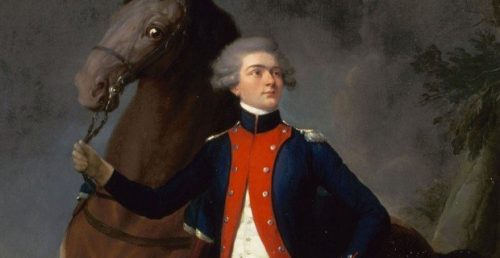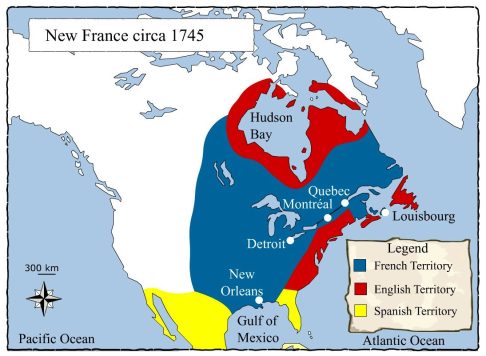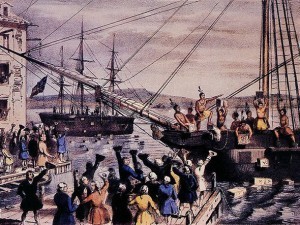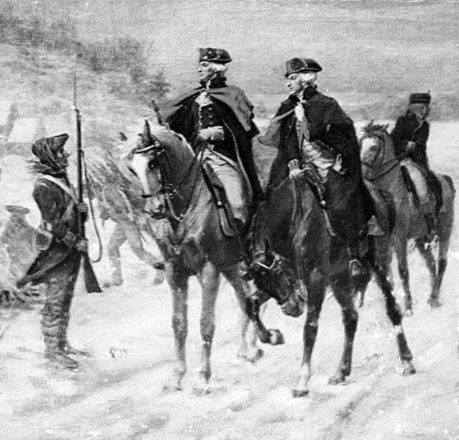
French revolutionary ideas were influenced by the political systems and experiences of other nations. The most significant of these influences was the American Revolution. Ending just as revolutionary tensions in France were building, the American Revolution provided the French with both a valuable source of revolutionary ideas and a working example of how a successful and moderate revolution might unfold.
The Americans rebel
In 1775, following a decade of tension and disputes over taxation and political representation, the 13 British colonies in eastern North America rebelled and declared their independence from the mother country. After eight years of war, the American colonies emerged victorious. They formed an independent republic called the United States of America. This new nation was founded upon three documents: a declaration of independence, a constitution and a bill of rights.
The American Revolution became an exemplar for those seeking change in France. It provided reformers with a working example of a successful revolution leading to the creation of a new state build on Enlightenment values. It also facilitated the spread of revolutionary ideas in France.
Ironically, France’s King Louis XVI and his government had actively supported the American Revolution, providing the American rebels with financial aid and military support. France’s contributions to the American Revolutionary War placed even greater pressure on the national treasury and helped facilitate the fiscal crisis of the 1780s.
The French in North America
France had its own interests in North America, dating back to the 1500s when French colonisers attempted a number of failed settlements along the eastern coast. The French eventually gained a foothold in the north (modern day Newfoundland) and the south (Louisiana, named for King Louis XIV).
French colonists in North America prospered and by the mid-1700s they occupied large swathes of the continent, including its southern coastline, the Mississippi and Ohio river valleys, the Great Lakes and the eastern half of modern-day Canada. Collectively, these possessions were known as New France. The British, in contrast, held a much smaller sliver of territory, a string of 13 small colonies clustered along the eastern coastline.
With British and French colonists living in close proximity, tensions in America were often high. Whenever Britain and France went to war in Europe, as they did several times in the 17th and 18th centuries, their colonists in America would follow suit.

Changes in the mid-1700s
The balance of power in North America changed dramatically after France’s defeat in the Seven Years’ War (1756-1763, known in America as the French and Indian War). As a consequence of this defeat and the treaty negotiations that followed, France surrendered most of its North American territory to Britain. The French government spent the next 15 years yearning for revenge and the recovery of its former colonies.
The British were not without their own problems. The costs of waging the Seven Years’ War pushed the British government into considerable debt. Britain’s acquisition of vast new territories in North America brought with it new costs and obligations for managing settlement, administration and defence.
In London, British ministers decided to offset these new expenses by tightening foreign trade and the collection of duties on imports and exports. They also levied a new tax, a stamp duty, on the British colonies in North America. Though considered minor at the time, they were policies the British government would live to regret.
From protests to war

The American colonists, having lived a century in comparative isolation from Britain, resented the imposition of British taxes and trade restrictions. To justify their opposition to British policy, the Americans turned to political theory and Enlightenment ideas.
Taxation without political representation was illegal, they argued. Because no American sat in the British parliament, the parliament had no right to tax Americans. Taxing citizens without representation and impinging on their right to free trade also conflicted with John Locke’s doctrine of natural rights.
Opposition to British policy began as debates and vocal criticism but soon hardened into non-compliance, defiance, confrontation and acts of violence. In December 1773, rebels in Boston, Massachusetts stormed British ships and tipped a fortune of privately owned tea into the sea. London responded to this wilful vandalism with punitive measures, including the closure of Boston Harbour and the imposition of a military government in Massachusetts.
Outraged Americans began mobilising to defend themselves from British aggression and within 18 months, Britain and her former colonies were at war. On July 4th 1776, the American revolutionaries, through the pen of Thomas Jefferson, declared their independence with a stirring synthesis of Enlightenment ideas and values:
“When in the course of human events, it becomes necessary for one people to dissolve the political bands which have connected them with another… they should declare the causes which impel them to the separation. We hold these truths to be self-evident: that all men are created equal, that they are endowed by their Creator with certain unalienable Rights, that among these [rights] are Life, Liberty and the pursuit of Happiness. That to secure these rights, governments are instituted among men, deriving their just powers from the consent of the governed. [And] whenever any form of government becomes destructive of these ends, it is the right of the people to alter or to abolish it.”
Revolution fascinates France
The events in America fascinated France. The politically minded salons and clubs thrummed with news of events across the Atlantic. American revolutionaries like Benjamin Franklin (already idolised in France for his scientific discoveries), Thomas Jefferson and George Washington became household names. Revolutionary tracts by American philosophes like Jefferson and Thomas Paine were eagerly sought and studied intently.
The French government also rejoiced at events in America, though for political rather than ideological reasons. Louis XVI and his ministers were delighted at the difficulties experienced by their British rivals. If British authority in North America collapsed, France may be presented with an opportunity to regain her former colonies.
Short of money, munitions and naval power, the American revolutionaries lobbied Versailles for a military alliance. The king and his ministers resisted these calls at first. Instead, they quietly provided the American revolutionaries with financial aid and logistic support.
French involvement

In the first three years of the American Revolutionary War, dozens of French military officers and noblemen travelled abroad to serve with the Americans as volunteers. Their motives for doing so varied. Some were inspired by the ideas of the American Revolution; some were young officers craving a taste of battle; others were more experienced soldiers yearning for revenge against the British.
The most famous of these volunteers was Gilbert du Motier, the Marquis de Lafayette. The son of a colonel killed in battle, Lafayette followed his late father into the military and became a cavalry officer.
In 1777, Lafayette ignored the orders of his superiors and set sail for America, where he had been promised a generalship, despite still being in his teens. By September 1777, the young Frenchman was working as an aide to George Washington, the commander in chief of the American Continental Army.
Lafayette acquitted himself well in battle and was given his own divisional command. He became close friends with Washington, who some historians suggest came to consider Lafayette as an adopted son.
“While [Lafayette] set out to win glory on the field of battle, the ‘American spirit’ impressed itself on his mind and made him a champion of the cause, turning this young and prestigious scion of the French nobility into a central figure of liberal and reformist thought prior to the revolution. As early as his first visit to America, he became an enthusiastic supporter of equal rights and a champion of the civic spirit demonstrated by American citizens.”
François Furet, historian
Military alliance
Through 1776 and 1777, Versailles resisted calls to ally with the Americans and declare war on Britain. The government’s hesitation was understandable: much of the French navy was in refit, the treasury was short of funds and the prospects for an American victory were unclear.
An American triumph at the Battle of Saratoga (October 1777) was a turning point in the war, however, and persuaded the French king to commit further. France signed a military alliance with the American states in February 1778 and declared war on Britain the following month.
In the first two years of the alliance, France’s military contribution was confined to naval support. This proved crucial, however, because it negated Britain’s dominance on the seas. Large numbers of French troops eventually landed in America in 1780. French troops under Count Rochambeau played an important role in the Siege of Yorktown (October 1781), the last major battle of the American Revolutionary War.
The treaty to end the Revolutionary War was signed in Paris in September 1783.
Impact on France
Politically, France gained little from its involvement in the American Revolution. The king and his ministers hoped to regain at least some of their colonial territory in America – but their interests were undermined by the Americans, who initiated secret negotiations with the British before the treaty negotiations had started. Because of this, France’s only gains in America were the Caribbean island of Tobago and Senegal in western Africa.
Financially, the French war effort was funded with new or refinanced loans rather than new taxes. The cost of this involvement exceeded one billion livres and left the French treasury with an even greater interest burden.
Ideologically, France’s elites hailed the American Revolution as a victory for Enlightenment ideals over old world despotism. The ‘spirit of America’ filled the clubs and salons. Men like Lafayette, Washington and Jefferson were feted as champions of an emerging modern order.
The newly formed United States became a model for French reformers. The political ideas of the Enlightenment – Locke’s natural rights, Rousseau’s popular sovereignty, Montesquieu’s separation of powers – had once been political abstractions, little more than ideas in books. The birth of the United States showed these ideas could indeed work in practice and serve as a blueprint for modern government.

1. The American Revolution (1775-1783) was initiated by British colonists in eastern North America, who sought freedom and independence from British imperial control.
2. It begun as a political dispute over Britain’s right to levy taxes on its colonists in America. The colonists objected to this, citing Enlightenment ideas and the right to political representation.
3. Many French nobles and elites were fascinated by these events. Though their motives were not always ideological, many French military officers volunteered to enlist and fight with the Americans.
4. France provided financial support to the Americans and, in 1778, also declared war on Britain. France’s involvement in the American Revolutionary War would cost more than one billion livres.
5. The success of the American Revolution provided French reformists with inspiration. It showed that revolution could succeed and that Enlightenment ideas and values could be used as the basis of a new political system.
Citation information
Title: ‘The American Revolution’
Authors: Jennifer Llewellyn, Steve Thompson
Publisher: Alpha History
URL: https://alphahistory.com/frenchrevolution/american-revolution/
Date published: September 27, 2019
Date updated: November 7, 2023
Date accessed: April 16, 2024
Copyright: The content on this page is © Alpha History. It may not be republished without our express permission. For more information on usage, please refer to our Terms of Use.
